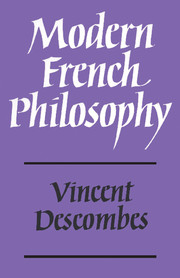Book contents
- Frontmatter
- Contents
- Foreword by Alan Montefiore
- Note on abbreviations and translation
- Introduction: Philosophy in France
- 1 The humanisation of nothingness (Kojève)
- 2 The human origin of truth (Merleau-Ponty)
- 3 Semiology
- 4 The critique of history (Foucault, Althusser)
- 5 Difference (Derrida, Deleuze)
- 6 The end of time (Deleuze, Klossowski, Lyotard)
- Index
Introduction: Philosophy in France
Published online by Cambridge University Press: 05 June 2012
- Frontmatter
- Contents
- Foreword by Alan Montefiore
- Note on abbreviations and translation
- Introduction: Philosophy in France
- 1 The humanisation of nothingness (Kojève)
- 2 The human origin of truth (Merleau-Ponty)
- 3 Semiology
- 4 The critique of history (Foucault, Althusser)
- 5 Difference (Derrida, Deleuze)
- 6 The end of time (Deleuze, Klossowski, Lyotard)
- Index
Summary
Can the colour of time be described? Who could say what the atmosphere of a period was?
At the outset of this survey I should define its inevitable limits. French philosophy is the philosophy which is articulated in French, even when it is to state Greek, Latin, English or German thoughts in this language. French philosophy was born when Descartes undertook to reply, in French, to Montaigne's Essays with his Discourse on Method, followed by three Essays with this method. But it was more than French philosophy that appeared with Descartes's challenge to Montaigne. According to the most considerable authorities, for once in agreement – Hegel and Heidegger for example – the pursuit of a truth that has the character of absolute certainty marks the inauguration of modern philosophy.
The following pages are intended to be an introduction to contemporary French philosophy. A survey of French philosophy as a whole would start with Descartes (replying to Montaigne). A survey of modern philosophy would begin in the same way. The title of the study whose first page you are reading now proposes a more modest undertaking: to acquaint a reader whom I assume, for the sake of hypothesis, to be as exterior as possible to French philosophical traditions and modes, with the language and issues of what is known as philosophical debate in France today.
- Type
- Chapter
- Information
- Modern French Philosophy , pp. 1 - 8Publisher: Cambridge University PressPrint publication year: 1981



